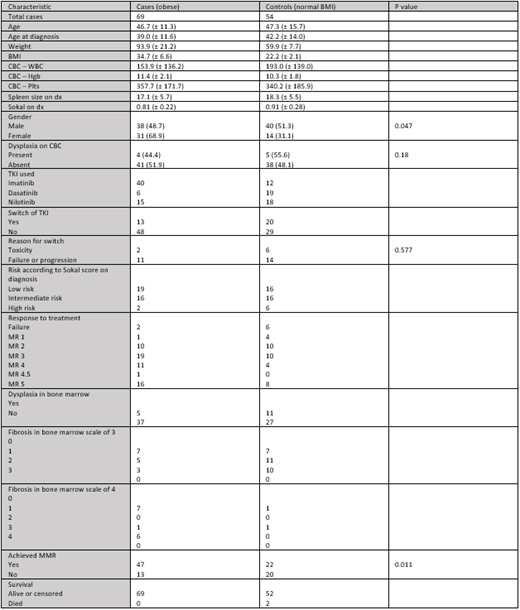Background and Objectives:
Cancer patients in Qatar are managed in a standardized manner through a single center guided by the National Cancer Framework. Most cancer medication-dosing is based on weight and height (body surface area), however in CML, tyrosine kinase inhibitors (TKIs) dosing is fixed. Obesity, defined by a BMI of 30 or more, presents a risk to health yet to the best of our knowledge, there have been no large studies on obesity and response to TKI therapy in CML. The aim of this study was to explore the clinical characteristics of obese and non-obese CML patients, and compare their response to standard dose TKI therapy.
Methods:
A retrospective analysis was performed of 123 patients treated for CML in chronic phase at NCCCR over a 23-year period, 69 obese (BMI > 30) vs. 54 with normal BMI = 18.5 - 24.99 (controls). Comparisons were made of characteristics at diagnosis including: gender, age, ethnicity, CBC parameters, spleen size, Sokal score, bone marrow findings, TKI prescribed, together with response assessment using ELN guidelines.
Results:
Mean age at diagnosis was lower in obese patients compared with control group (39.0 vs 42.2). Obese patients had lower WBC count and higher Hgb at diagnosis (mean WBC 153.9 vs. 193.0; mean Hgb 11.4 vs. 10.3). A higher proportion of obesity group was females (31/69) compared to control group (14/54). Spleen size and Sokal scores were lower in obesity group (17.1 vs. 18.3 and 0.81 vs. 0.91 respectively). More obese patients received Imatinib (40 vs. 12 in control group) compared with other TKIs (21 vs. 37 in control group). Few patients in obesity group had to switch to an alternative TKI (13 vs. 20 in control group). Compared to control group more obese patients achieved a major molecular response (MMR defined as BCR-ABL/ABL (IS) value below 0.1%) (47 of 60 vs. 22 of 42; p = 0.011).
Conclusions:
The data suggests differences in clinical characteristics and response to treatment between obese and non obese patients that warrants further investigation. Obese patients with CML were younger at diagnosis, had better response to treatment and were less likely to need switch TKI due to failure of treatment.
No relevant conflicts of interest to declare.
Author notes
Asterisk with author names denotes non-ASH members.


This feature is available to Subscribers Only
Sign In or Create an Account Close Modal